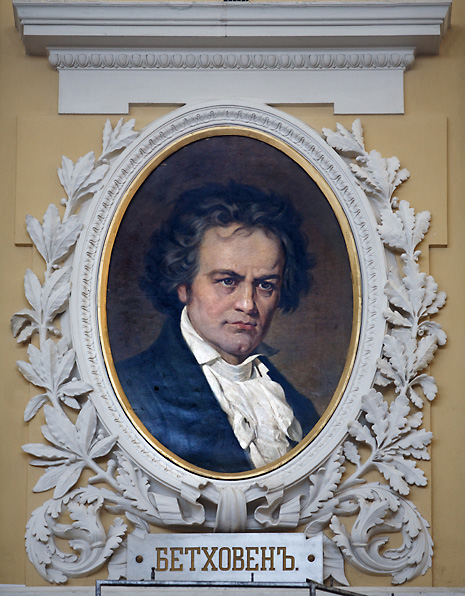

Ludwig van Beethoven (1770-1827) was a German composer, pianist and conductor, a representative of the Viennese Classical school. He studied the rudiments of composition and performance skill with Christian Gottlob Neefe. He perfected his compositional skills by studying with Joseph Haydn and Johann Georg Albrechtsberger. During the years 1770–1792 he lived in Bonn, and in 1792–1827 he lived in Vienna. In 1792, having arrived in Vienna Beethoven took lessons from Haydn.
From the age of 13 Beethoven was the organist of the Bonn Court Cappella. Beethoven’s concert performances in Vienna, Prague, Berlin and Dresden took place with an immense amount of success. His increasing deafness caused him to decrease his concert activities, and after 1815 to cease them altogether.Beethoven’s worldview received a strong influence from the ideas of the German Enlightenment and the events of the French Revolution. The composer’s music is connected with the art, literature and philosophy contemporary to him, as well as with the artistic legacy of the past. The main philosophical motive of Beethoven’s art is the theme of heroic struggle for freedom. In addition, Beethoven wrote many compositions which expressed the personal emotional experiences of human beings.
Following Haydn and Mozart, Beethoven developed the forms of classical music, expanding and enriching the sonata and symphonic cycles, as well as the principles of variation development.
His most famous compositions are: the opera “Fidelio,” the ballet “The Creatures of Prometheus;” works for soloists, chorus and orchestra – the oratorio “Christ on Olive Mountain,” “Missa Solemnis” and a number of cantatas; works for orchestra – 9 symphonies, overtures (including the overture to Goethe’s tragedy “Egmont”), concertos for solo instruments and orchestra; works for chamber instrumental ensemble, including 16 string quartets and ten sonatas for violin and piano, most notably Sonata N.9, the “Kreuzer Sonata;” works for piano, including 32 piano sonatas – most notably N.8 “Pathetique,” N.14 “Moonlight Sonata” and N.23 “Appassionata” – variations and bagatelles; incidental music for theatrical performances and songs for voice and piano. Of great bibliographical interest are the “conversation notebooks” which Beethoven used, starting with the time of his complete deafness.